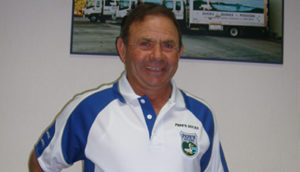Read the latest information on
Foot-and-mouth disease
 Having put home-grown duck firmly on the Australian dinner plate, over the past two decades Pepe Bonaccordo has been cementing the future growth of the industry by developing and enforcing uncompromising standards on biosecurity, food safety and animal welfare.
Having put home-grown duck firmly on the Australian dinner plate, over the past two decades Pepe Bonaccordo has been cementing the future growth of the industry by developing and enforcing uncompromising standards on biosecurity, food safety and animal welfare.
“We feel very excited about winning the Biosecurity Producer of the Year Award,” Mr Bonaccordo said.
“It does tell us that a lot of the hard work that we’ve done has been recognised by other people. It’s important that we build a great foundation underneath our market, and that foundation is: good farming management practices, good biosecurity, animal welfare, food safety, training – that’s what brands are built on.”
Starting in 1976 as a backyard business with just 22 Pekin ducks, Pepe’s Ducks now supplies 80,000 birds a week out of its facility at Windsor, NSW, and is the largest producer of ducks in Australia and New Zealand.
Having put home-grown duck firmly on the Australian dinner plate, over the past two decades Mr Bonaccordo has been cementing the future growth of the industry by developing and enforcing uncompromising standards on biosecurity, food safety and animal welfare.
“When it comes to biosecurity, for many years we were under the umbrella of the chicken industry,” Mr Bonaccordo said.
“But a duck’s needs are quite different to those of a chicken. Put simply, if you put a duck in a bucket of water and you put a chicken in a bucket of water, one will float, the other won’t. That goes all the way through to factors like the densities of our sheds, the way we grow the ducks, husbandry, animal welfare, water requirements and so on.”
In 2006, in an effort to develop industry-wide biosecurity standards, Mr Bonaccordo drove the establishment of the Australian Duck Meat Association, along with the other major player in the market (Luv-a-Duck).
The association’s crowning achievement was the production, last year, of the Farm Biosecurity Manual for the Duck Meat Industry. The manual identifies areas of risk common to all duck enterprises along with appropriate measures to minimise those risks.
While Pepe’s handles most of the breeding, hatching and slaughter itself, 90% of the growing of the animals is now done by contracted growers and the company has been hard at work rolling out the manual across the industry.
“We’ve seen a lot of issues with poultry diseases, particularly in Europe and Asia,” Mr Bonaccordo said.
“We thought that we needed to do something as an industry to ensure our biosecurity. We’ve also had more of our people trained in emergency animal disease response – another step that we’ve taken so that if there ever was an emergency outbreak we were prepared for it.”
Duncan Rowland, Manager of Biosecurity Planning and Implementation at Animal Health Australia, said Mr Bonaccordo demonstrated a clear passion for improving biosecurity, not only in his own business but for the broader industry.
“The judges were particularly impressed with the market drivers Pepe’s have introduced for better biosecurity and the way they’ve demonstrated that biosecurity systems provide a standard of excellence that helps meets customer needs,” Mr Rowland said.
“We feel very excited about the win,” Mr Bonaccordo said.
“It tells us that a lot of the hard work that we’ve done has been recognised by other people. It’s important that we build a great foundation underneath our market. And that foundation is: good farming management practices, good biosecurity, animal welfare, food safety, training – that’s what brands are built on.
“The duck has become a lot more acceptable to the average Australian, hence the need to grow our business. We want to build a new factory, we want to build a new hatchery because the demand tells us that the facilities we have at the moment are not coping with the demand.